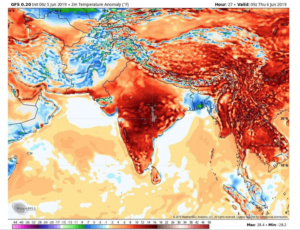The World Meteorological Organization (WMO) and Global Water Partnership (GWP) have joined hands in a Framework Memorandum for Integrated Water Resources Management. A welcome piece of news as an ever more thirsty world is hit by heatwaves and water scarcity.
Planet earth is covered by 1,390 million kilometres cubed of water, of which 97.5% is the salty water of our seas and oceans. Only 2.5% is freshwater, more than half of which held in ice at the polar caps. Yet freshwater is essential to human existence. From a healthcare point of view, one billion people do not have access to clean water and by 2050 at least one in four people is likely to live in a country affected by chronic or recurring shortages of freshwater. In urban areas in developing countries, the number of inhabitants exposed to prolonged water scarcity will increase sevenfold, passing from the current 150 million citizens that struggle to gain access to water for drinking and sanitation, to over one billion. In fact, the consequences of water scarcity are far reaching and negatively impact food security, livelihood choices and access to education for poor families.
A WMO study indicates that water insecurity costs the global economy around USD 500 billion per year – which doesn’t even consider environmental impacts. In particular, vulnerable economies could experience a 20% increase in per capita GDP over a period of 30 years if there is a 50% reduction in the impacts of drought. This can be achieved by investing in water security, a fundamental cog in long-term sustainable growth.
In fact, Sustainable Development Goal #6 is not only about the urgent need for clean water and sanitation for everyone, it encompasses a wider spectrum of issues related to managing water resources, including the work of the GWP for an integrated approach to water use by all economic sectors.
It is important to recognise that the issue of water scarcity is also a man made problem. Anthropogenic climate change is having a significant effect on our ability to access freshwater consistently. There are manifold ways in which these effects can be seen, ranging from the melting of inland glaciers and prolonged drought in subtropical regions to the overall intensification of the water cycle that causes more extreme floods and droughts globally.

In the past few weeks, in what is becoming an ever more frequent phenomenon in this period of the year, intense heat in Indian villages and towns have come hand in hand with water shortages. This is also due to a delay in the onset of the monsoon season. According to the Drought Early Warning System, 43% of India is reeling under drought with the situation particularly troublesome in Maharashtra, Tamil Nadu and Karnataka. In fact, record temperatures are becoming something of a regular occurrence in India: 15 of their warmest years on record have come since 2004.
Fortunately, there is increasing global awareness of the water problem. On June 6th, at the Hydrological Assembly during the World Meteorological Congress, the WMO and GWP signed a Framework Memorandum of Understanding (MoU) on strategic collaboration to achieve the objectives of Integrated Water Resources Management. At the signing of the MoU, Monika Weber-Fahr, Executive Secretary and CEO of GWP stated that: “We are in a water crisis. It is a crisis about too much water, too little water and too dirty water. Nothing is easy when it comes to water, but nothing is as inspiring as cooperation on water. It is high time to achieve more climate-resilient water management, the bar needs to raise.”
Proposed measures include: strengthening the management of hydro-climatic extremes through the joint programmes on flood (APFM) and drought (IDMP); improving the capacity of countries to develop high priority water and climate projects; promoting stakeholder engagement on developing water information and products at the regional and country level; and facilitating joint programmes, project development, service delivery and joint resource mobilization.
“The impacts of climate change are felt through temperature increase and, more significantly, changes in precipitation. There are areas which are becoming drier and areas where there is more flooding. This has a major socio-economic and political impact. Thus WMO cooperation with the Global Water Partnership is really important to develop capacity for better management of water resources,” concludes WMO Secretary-General Petteri Taalas.






